

Adult Education FAQS. Daniel Schugurensky, Department of Adult Education and Counselling Psychology The Ontario Institute for Studies in Education of the University of Toronto (OISE/UT) Edited by Daniel Schugurensky This site includes questions and answers on Adult Education that were written by students in the course 'Outline of Adult Education' at OISE/UT.
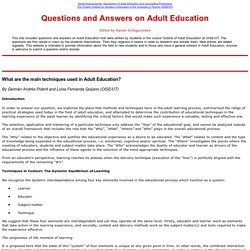
The questions are first raised in class by the students themselves. Then they organize in teams in order to research and answer them. New entries are added regularly. What are the main techniques used in Adult Education? By Germán Andrés Piderit and Luisa Fernanda Quijano (OISE/UT) Introduction The selection, application and mastering of a particular technique only address the “How” of the educational goal, and cannot be analyzed outside of an overall framework that includes the role that the “Why”, “What”, “Where” and “Who” plays in the overall educational process.
Learning a New Skill is Easier Said Than Done - Gordon Training International. By Linda Adams, President of GTI Before rolling out specific training or initiatives that are aimed at improving some facet of your business, you need to ensure that your leaders and team members are equipped with fundamental communication and relationship management skills.
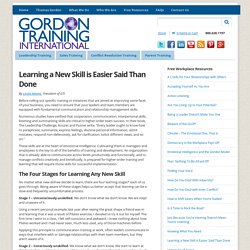
Numerous studies have verified that cooperation, communication, interpersonal skills, listening and summarizing skills are critical to higher-order team success. In their book, The Leadership Challenge, Kouzes and Posner write, “Every leader ought to know how to paraphrase, summarize, express feelings, disclose personal information, admit mistakes, respond non-defensively, ask for clarification, solicit different views, and so on.” These skills are at the heart of emotional intelligence. Cultivating them in managers and employees is the key to all of the benefits of training and development. No matter what new skill we decide to learn, there are four learning stages* each of us goes through.
The Conscious Competence Ladder - Learning Skills from MindTools.com. Keeping Going When Learning Gets Tough Also called the "Conscious Competence Matrix," the "Learning Matrix," and the "Four Stages of Learning.
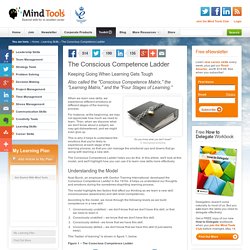
" Do you know what you don't know? © iStockphoto/winterling When we learn new skills, we experience different emotions at different stages of the learning process. For instance, at the beginning, we may not appreciate how much we need to learn. This is why it helps to understand the emotions that you're likely to experience at each stage of the learning process, so that you can manage the emotional ups and downs that go along with learning a new skill. The Conscious Competence Ladder helps you do this. Understanding the Model Noel Burch, an employee with Gordon Training International, developed the Conscious Competence Ladder in the 1970s. The model highlights two factors that affect our thinking as we learn a new skill: consciousness (awareness) and skill level (competence).
This "ladder of learning" is shown in figure 1, below. Uses Tip: Key Points. Training Needs Assessment (TNA) - Team Management Training from MindTools.com. Making Sure Your Team is Properly Trained Bridging the knowledge gap. © iStockphoto/sunlow Abigail's boss has asked her to train her department on recent legislative changes affecting her industry.
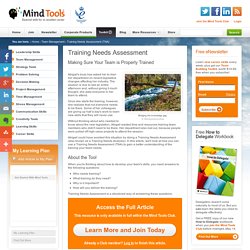
The session is due to last an entire afternoon and, without giving it much thought, she asks everyone in her team to attend. Once she starts the training, however, she realizes that not everyone needs to be there. Without thinking about who needed to know about the new legislation, Abigail wasted time and resources training team members who didn't need to be there. Abigail could have avoided this situation by doing a Training Needs Assessment (also known as a Training Needs Analysis).
About the Tool When you're thinking about how to develop your team's skills, you need answers to the following questions: Who needs training? Training Needs Assessment is a structured way of answering these questions. Access the Full Article This resource is only available in full within the Mind Tools Club. ‘Gordon’s Skill Development Ladder’ & TEL. During my current MOOC & Badge exploration, I’ve come across a great little course on the Open2Study platform called ‘Teaching Adult Learners‘.
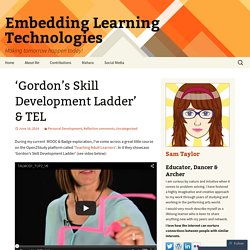
In it they showcase ‘Gordon’s Skill Development Ladder’ (see video below): I have never come across this before, and think it could be useful for those of us wanting to develop our colleagues’ skills in the use of technology to enhance their teaching. I love the saying ‘you don’t know what you don’t know’ (classed as ‘Unconsciously Unskilled’ in Gordon’s Model) and could apply to anyone using the VLE. I’m not complaining about our lecturers’ usage of our Moodle – I just want to show them how it can be so much more than somewhere to upload files and weblinks. Anyone else using this model/ladder? Sam x Like this: Like Loading...